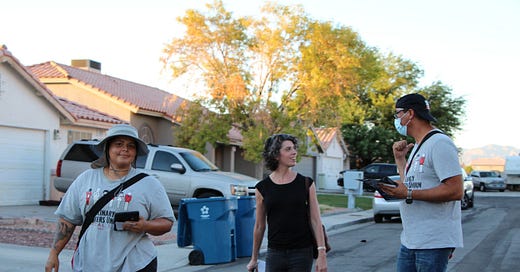The Nevada Senate Race Is the Future of American Politics
The Latino vote is up for grabs, with major consequences for both parties
It’s always fun to go back to Nevada, where I got my start covering politics more than a decade ago. In my new piece in TIME, I take a look at the state’s tight Senate race between Democrat Catherine Cortez Masto and Republican Adam Laxalt:
Cortez Masto, 58, is seeking reelection in what may be the nation’s tightest Senate race, separated from her opponent, former Nevada attorney general Adam Laxalt, by less than half a point in the most recent polling average. Both candidates are making an aggressive play to appeal to Latinos, a voting group that is key to victory in Nevada and looks up for grabs in ways it hasn’t been in decades.
The Nevada election this year is emblematic of the dynamics at play across the country in 2022, with a Democratic candidate desperately pleading for another chance, a Republican opponent pandering to the party’s hard-right base, and a polarized electorate caught in the middle. It has the potential to do more than determine which party holds the majority in the Senate. It’s a signpost to the future of American politics: a crucial test of whether Democrats can hold onto, or Republicans can peel off, the voting bloc that could determine future elections for a generation or more.
In all the recent discourse about the Hispanic vote, I’m surprised one factor hasn’t gotten more attention: Democrats’ broken (or at least long-deferred) promises on immigration.
Democrats have long pointed to Republicans’ anti-immigrant rhetoric and hostility to legalizing the undocumented to convince Latinos that the GOP is not on their side. Shutting the border and expelling would-be migrants were central to Trump’s political project, and equally key to the anti-Trump backlash among well-educated suburban voters who found his approach unconscionably cruel. But the Biden Administration has run from the issue, advocates say, seeking to downplay the humanitarian crisis at the border and making no major push for immigration reform. Now, after more than a decade of telling Hispanics that immigration was the reason they had no choice but to vote for Democrats—a decade in which little has been done for the more than 10 million undocumented—the party seems shocked to find these appeals are no longer credible.
I left Nevada shortly after the 2008 financial crisis, and it’s bracing to be back after a time of similar devastation: by some measures, COVID hit Vegas even harder than the Great Recession. If you’ve spent any time there, you’ll recognize this landscape:
It’s a neighborhood of long flat streets and one-story stucco houses, with cinderblock walls rather than fences and rock-pile yards. Grass yards are illegal in Las Vegas, a consequence of the region’s long-running drought. Roberto’s house has a strand of Christmas lights strung from the eaves, a couple of busted chairs on the small front porch, and a Dodge Durango in the driveway. Down the street, I glimpse a rumpled piece of cardboard in the backseat of a beat-up sedan: NEED GAS AND FOOD, it says. GOD BLESS. WILLING TO WORK.
So what messages are the parties using to appeal to this crucial voting bloc at a time of economic hardship? For Democrats, it’s about deflecting blame:
It’s always difficult for the party in power to convince voters to keep them in office when things aren’t going well. Many of the arguments Democrats are deploying this cycle—that things are about to get better, or aren’t really so bad, or that the other side would make things even worse, or that some other issue (immigration, abortion, the future of democracy) takes precedence—tend to fall flat with voters whose pocketbooks are strained.
Instead, Culinary has come up with a different message: someone else is to blame. By blaming Big Oil and Wall Street, the union hopes to convince voters that Democrats are not the problem but the solution. “We’re finding that folks are receptive to that,” he says. “They’re enthusiastic about wanting to do something about that and fight back.”
For Republicans, it’s largely about the economy and crime, but not entirely:
Pocketbook concerns aren’t the only driver of this shift. It’s also clear that at least some Latinos feel alienated by liberals’ vision of social justice. Lydia Dominguez, a 33-year-old Air Force veteran and single mother, tells me she voted for Obama twice before becoming disenchanted after he expressed support for Trayvon Martin and Black Lives Matter. “I truly had hope for him, and to see him divide the country instead of bringing us together really made me distance myself from the Democratic Party,” she says. A domestic violence survivor, she jokes that she is “breaking the generational cycle of political abuse” by leaving the Democrats.
Krissian Marquez, a campaign volunteer and community activist and the wife of Jesus Marquez, says many Hispanic women feel “canceled” by “the whole Latinx thing” and don’t want their children “exposed to this whole wokeness.” “Yes, immigration—we all know somebody that needs to be legal,” she adds. “But realistically, we want to make sure that we have a job, that our children are going to a good school.”
Read on for some Harry Reid nostalgia, a Jon Hamm reference, a Mexican soccer chant and much more. The piece is here.
(Photo by Marcos Rivera, courtesy Culinary Workers Union)



